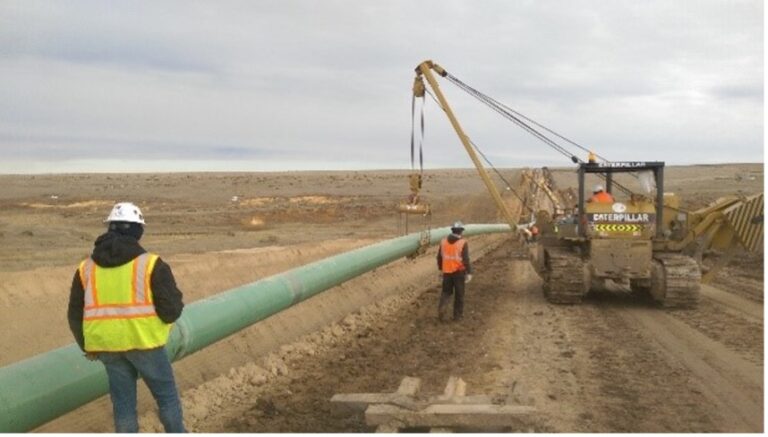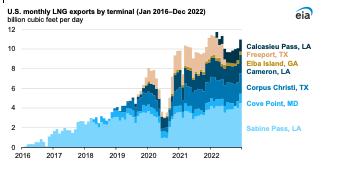On March 8, a U.S. House of Representatives subcommittee held a hearing in Washington, D.C. to discuss pipeline safety. In the aftermath of last month’s freight train derailment in East Palestine, the subcommittee members and the pipeline experts who testified all agreed that there was no pipeline-related issue more important than safety.

https://www.phmsa.dot.gov/pipeline/pipeline-construction/phases-pipeline-construction-overview
The U.S. has about 3.4 million miles of pipeline, the largest and most complex pipeline network in the world. They carry a wide range of liquids including gasoline, crude oil, propane, methane, renewable diesel, and liquid natural gas. Compared to trucks and trains, pipelines are considered to be more efficient, safer, and a more environmentally friendly mode of transporting energy.

https://primis.phmsa.dot.gov/comm/publications/pipa/naco-pipa-summaryreportforelectedofficials-june2011.pdf
Nearly two-thirds of the energy consumed in the U.S. is transported via pipelines. Moreover, pipelines play a vital role in a rapidly growing export market. Although the U.S. did not begin exporting liquid natural gas from the lower 48 states until 2016, the country is expected to export more than 12 billion cubic feet per day in 2023 according to the U.S. Energy Information Administration.

The House Transportation and Infrastructure’s Subcommittee on Railroads, Pipelines, and Hazardous Materials has jurisdiction over the Pipeline and Hazardous Materials Safety Administration (PHMSA), a U.S. Department of Transportation agency responsible for overseeing the safe and reliable operation of the pipeline network.
Numerous participants at the subcommittee’s hearing referred to major pipeline accidents. Rep. Donald Payne (D-NJ) mentioned the rupture of the Keystone pipeline in Kansas that spilled nearly 600,000 gallons of crude oil in December. Bill Caram, a pipeline safety advocate, noted that in 2020, 45 people were taken to a local hospital after a carbon dioxide pipeline ruptured in Mississippi. And, Rep. Marilyn Strickland (D-WA) said that a recent pipeline leak in North Carolina released 2 million gallons of fuel into a nature preserve.
In the waning days of the Trump Administration, Congress passed the Pipeline Safety Act of 2020 to reauthorize pipeline safety programs through 2023. The subcommittee chairman, Rep. Troy Nehls (R-Texas), is now looking to reauthorize the program again in a bipartisan manner. He noted that pipeline safety is a collaborative effort between PHMSA, state governments, industry, and the public.
Four witnesses testified at the hearing:
• Mr. Tristan Brown, Deputy Administrator, Pipeline and Hazardous Materials Safety Administration (PHMSA)
• Andrew Black, President and CEO, Liquid Energy Pipeline Association
• Kenneth W. Grubb, Chief Operating Officer – Gas Pipelines, Kinder Morgan, Inc.
• Bill Caram, Executive Director, Pipeline Safety Trust
Along with growing exports and associated strains on pipelines and storage facilities, Brown noted that PHMSA is regulating more facilities and the scope and complexity of his agency’s mission is growing. Black, representing pipeline owners, expressed his frustration that the department’s regulations are not keeping up with new technologies and methods. Grubb and others want the department to hire more safety engineers to write regulations.
With some rules taking more than 20 years to finalize, Brown said, “Our ability to get things done is proportional to the resources given by Congress.”
Brown admitted that PHMSA’s pace issuing new regulations and modernizing old ones is “is not what anybody in this room would like it to be.” His agency, he said, cannot compete with private sector salaries. Brown said he wants to be able to pay more and at least have a “level playing field with other federal agencies.”
The issue of protecting pipelines from both protesters and saboteurs was raised, but Brown said that PHMSA addresses operations not security. Attacks on pipelines fall under the jurisdiction of the Transportation Security Administration. Federal agencies, Brown explained, need to work closely with each other and with private companies to protect pipelines. Cyberattacks on pipelines are not a theoretical threat. In 2021, the largest fuel pipeline in the country was shut down because hackers gained entry into the Colonial Pipeline’s computer networks.
Several Republicans claimed that PHMSA seemed to be prioritizing climate change over safety, but Brown tried to convince them that his agency was not changing its top priority and that it needed to hire environmental specialists because Congress has directed “us to consider environmental impacts.”






